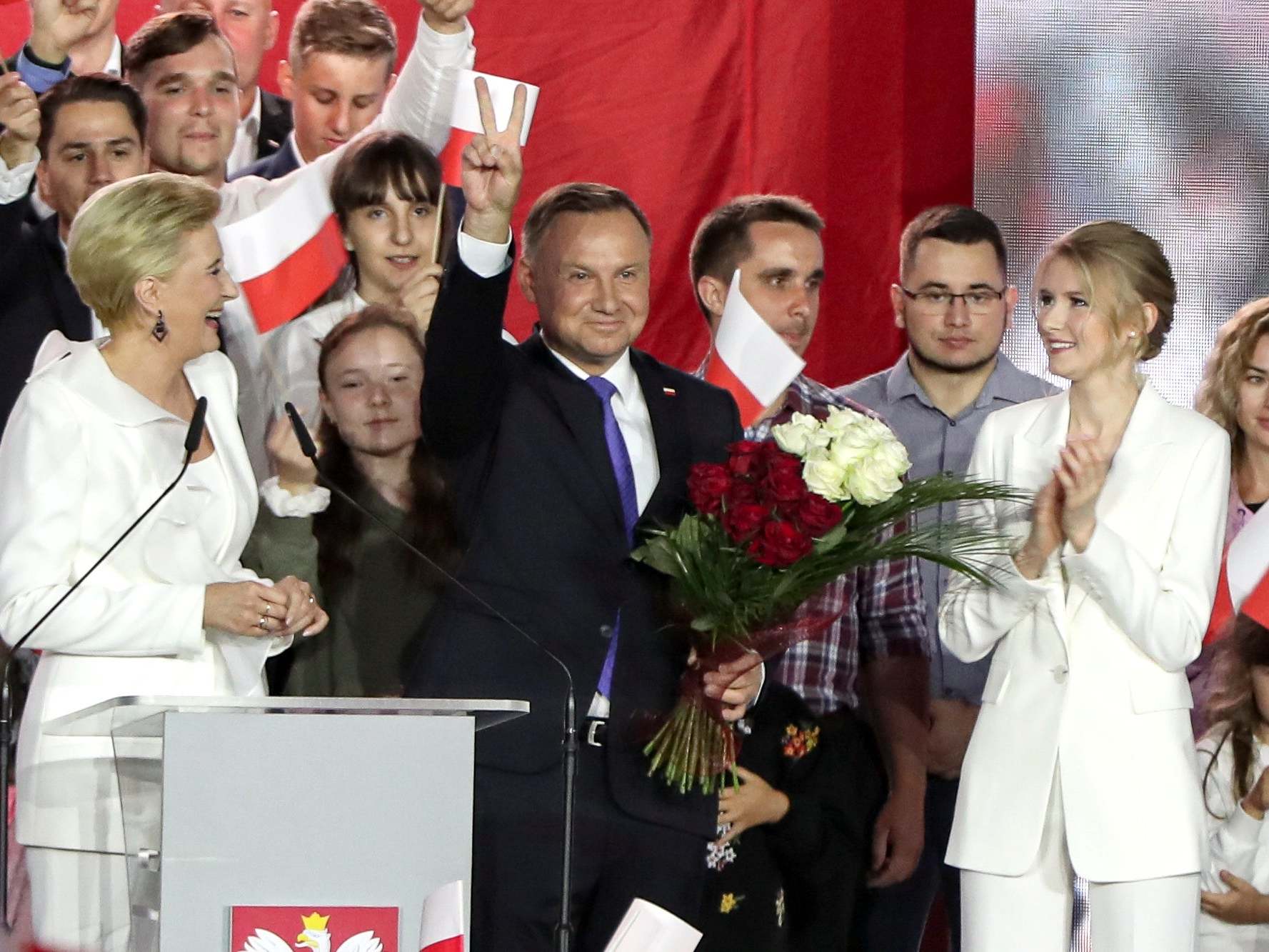Poland election: President Andrzej Duda on course for narrow victory, exit poll and early results show
Re-election of conservative could have profound implications for country's relationship with EU

Your support helps us to tell the story
From reproductive rights to climate change to Big Tech, The Independent is on the ground when the story is developing. Whether it's investigating the financials of Elon Musk's pro-Trump PAC or producing our latest documentary, 'The A Word', which shines a light on the American women fighting for reproductive rights, we know how important it is to parse out the facts from the messaging.
At such a critical moment in US history, we need reporters on the ground. Your donation allows us to keep sending journalists to speak to both sides of the story.
The Independent is trusted by Americans across the entire political spectrum. And unlike many other quality news outlets, we choose not to lock Americans out of our reporting and analysis with paywalls. We believe quality journalism should be available to everyone, paid for by those who can afford it.
Your support makes all the difference.Incumbent Andrzej Duda has a marginal but widening lead in Poland‘s presidential election, according to a late poll which points to a result which could have profound implications for Warsaw’s relations with the European Union.
The re-election of Mr Duda, an ally of the ruling nationalists Law and Justice (PiS), is crucial if the government is to implement in full its conservative agenda, including judicial reforms that the European Union says are undemocratic.
Mr Duda’s challenger, liberal Warsaw mayor Rafal Trzaskowski, has pledged to repair Poland‘s relations with Europe and use the presidential veto power to hold back any legislation that would subvert the rule of law.
The late poll on Sunday by Ipsos showed the incumbent winning 50.8 per cent of the vote, while Mr Trzaskowski, the candidate of the main opposition party, the centrist Civic Platform (PO), had 49.2 per cent.
The poll, which combined exit-poll data with partial official results, showed Mr Duda’s lead widening from the 50.4 per cent he had in an exit poll.
“All we need is to count the votes. The night will be tense but I am certain that when the votes are counted, we will win,” Mr Trzaskowski told supporters in a park just outside Warsaw’s historic Old Town after the exit poll.
Opinion polls before the election had shown the candidates, both 48, neck and neck, with Mr Trzaskowski having closed the gap on Mr Duda, who initially looked like a clear favourite.
Backed by the government, Mr Duda ran an acrimonious campaign, laced with homophobic language, attacks on independent media and accusations levied against Mr Trzaskowski that he would serve foreign interests instead of Poland‘s.
Mr Duda, a devout believer, had painted himself as a defender of Catholic values and of the government’s generous social benefit programmes that have transformed life for many, especially in the poorer rural regions of the country.
He appeared conciliatory on Sunday. “If anyone was offended by anything I did or said in the last five years, not just during the campaign, please accept my apology,” he told supporters in Pultusk, a small town north of the capital.
Vote-counting was expected to continue through the night, but the electoral commission said it would not announce partial results as it has done in the past, but only the final result, possibly on Monday.
Borys Budka, the head of Mr Trzaskowski’s PO party, said it was “a scandal” that some voters abroad did not receive their mail-in ballots on time. “This a great failure of the state, regardless of who wins,” Budka told private broadcaster TVN24.
The election was the first time all voters had a choice to cast ballots by mail, a change in rules necessitated by the coronavirus pandemic.
For many religious conservatives in Poland, Mr Trzaskowski came to represent the threats facing traditional values when he pledged to introduce education about LGBT rights in the city’s schools.
The archbishop of Krakow, Marek Jedraszewski, told worshippers in the southern city of Czestochowa on Saturday that Poland faced a “lethal danger” from ideologies that seek to undermine the traditional family structure and corrupt children.
Mr Trzaskowski says he seeks a more tolerant Poland and has criticised PiS’ rhetoric, vowing to abolish state news channel TVP Info, which critics say gave overt support to Mr Duda in its programming.
“In politics, you should have opponents, not enemies,” Mr Trzaskowski said on Sunday. “They thought they had full power, but today they have fear in their eyes.”
Mr Duda’s re-election to a second five-year term would open up the prospect of three years of uninterrupted rule by PiS, which has controlled the powerful lower house of parliament since 2015, with the next national election scheduled for 2023.
Observers say his defeat could undermine the fragile parliamentary majority that supports the PiS government, raising the spectre of political instability as Poland is coping with the economic fallout from the coronavirus pandemic.
“It’s the first time since 2015 when we are not discussing the scale of a PiS victory but whether it will win at all,” said Rafal Chwedoruk, a political analyst.
The election is being closely watched in Brussels.
Before PiS and Duda came to power in 2015, Poland had one of the most pro-European administrations in the bloc’s ex-communist east. But it has grown increasingly isolated, with divisions focusing on climate change and migration, in addition to democratic norms.
Additional reporting by Reuters
Join our commenting forum
Join thought-provoking conversations, follow other Independent readers and see their replies
Comments